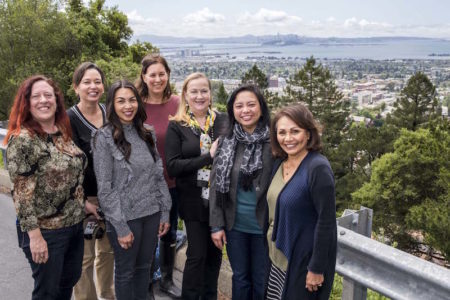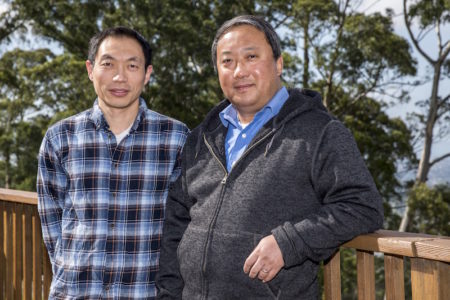May is Asian Pacific American Heritage Month, a time to pay tribute to the generations of Asian and Pacific Islanders who have enriched America’s history and are instrumental in its future success. This month we feature two Employee Activities Associations focused on Asian Pacific American culture—the Berkeley Lab Asian Association and the Fil-Am Club.
Berkeley Lab Asian Association
When Wanli Yang arrived at Berkeley Lab from China as a postdoctoral researcher 17 years ago, he faced some major cultural adjustments. One was that Yang was used to having weeks of vacation time for the two big Chinese holidays he’d celebrated all his life—the Mid-Autumn Festival and the Lunar New Year. He was surprised to not even have a day off for either in the U.S.
“My first experience with the Berkeley Lab Asian Association was attending their spring festival, celebrating the Lunar New Year,” says Yang, who is now a staff scientist at the Advanced Light Source (ALS). “It was great because I had been missing the big celebrations I’d taken part in all my life, and I made some nice connections right away.”
The Autumn Moon Festival (as it is also known) and the Lunar New Year celebrations are the two biggest events that the Berkeley Lab Asian Association (BLAA) organizes each year. Both are major holidays in Asian countries, based on the ancient philosophical belief that the moon has a more important effect on life and nature because it is closer to the Earth than the sun.
“For Asian people far away from their hometowns, to feel like there’s no celebration of these festivals that they’ve taken part in all their lives is a bit sad,” says Wang. “These events are well-loved and well-attended; it gives people a chance to really connect and feel like they still have these important holidays in their lives.”
While Yang has been involved in BLAA activities since he started at the Lab, the person most responsible for both the establishment and the continual operation of BLAA is the current/frequent president, Larry Guo, who works in the Lab’s HR division as a senior advisor to the International Researchers and Scholars Office.
Guo is often the first point of contact for new employees arriving at the Lab from abroad. Guo also came to Berkeley Lab as a young Chinese immigrant, and he was instrumental in getting BLAA started soon after he started at the Lab in 1999. The association became “official” in 2004 and is now the largest Berkeley Lab association with about 400 current members. For many years, Guo has managed BLAA, planning the budget and activities and organizing volunteers for all the BLAA events.
“When I started at the Lab in 1999, I saw that many new Asian employees had a difficult time assimilating to the Lab and the local community,” says Guo. “So I organized the association to help them and their families get settled into their new lives.”
BLAA started with a lot of informal activities—barbecues, hikes, camping—and has now grown to include the two festivals and occasional speakers. BLAA has also organized fundraisers for disaster victims in Asian countries, issues that really “hit home” for many Lab employees.
Guo says that BLAA plays a unique role in welcoming new Asian immigrants who arrive at the Lab. “As a new employee you want to find out about local resources from people who speak the same language and share the same culture,” says Guo. “By getting together we find comfort.”
Fil-Am Club

Berkeley Lab Filipino-American Association members (from left) Lida Gifford, Tina Clarke, Misty Enriquez, Gayle Tornberg, Deborah Rabuco, Madelyn Bello and Adel Serafino
Being involved in Berkeley Lab’s Filipino-American (Fil-Am) Club has given Tina Clarke something beyond the social and cultural benefits that all members enjoy—she’s gained a renewed connection to her Filipino grandfather, who passed away many years ago.
“My grandfather was a big influence in our family,” says Clarke, a senior compensation analyst at Berkeley Lab. “It’s been so great to hear the stories from Fil-Am members who know a lot about Filipino cultural history; there’s a lot that I had forgotten about Filipino culture, things my grandfather had shared with me when I was much younger.”
The Club, established in 2012, brings members together monthly to discuss books and films with a Filipino link, share traditional Filipino food and crafts, and learn more about Filipino culture and history from fellow members and guest speakers. The Club has enjoyed participating in the Lab’s Diversity and Inclusion Fair in the past, showcasing Filipino food, dance, and, in conjunction with the Lab’s Filipino Martial Arts Club, traditional Filipino martial arts.
Clarke’s sentiments are echoed by other Club members. Deborah Rabuco, an administrative assistant in the Lab’s Energy Technologies Area, isn’t Filipino, but her husband of 30 years is, and she has many Filipino friends and family. Being involved in the Fil-Am club has given Rabuco a venue for appreciating and learning about the culture of her loved ones, bringing them closer together.
“The Fil-Am Club has given me some interesting things to talk about with my Filipino sister-in-law,” says Gayle Tornberg, a disability/medical leave specialist at the Lab. “It gives us a sense of connection, and that is fun for me to have with her as well as with my nephew and niece. ”
For some members, the Fil-Am Club is a way to connect to their own culture in a way that wasn’t encouraged when they were younger, first-generation Americans, and the trend was to assimilate and be as “Americanized” as possible.
“My family immigrated from the Philippines before I was born,” says Madelyn Bello, an HR division partner. “I grew up with a lot of Filipino cultural influence, but I didn’t really appreciate it growing up, as there were many influences of assimilating into American culture at the time. As an adult, I’ve become interested in researching and learning more about my own cultural background.”
She adds: “Personally, I think it makes me richer when I am exposed to a diverse set of experiences and viewpoints.”
-Keri Troutman

